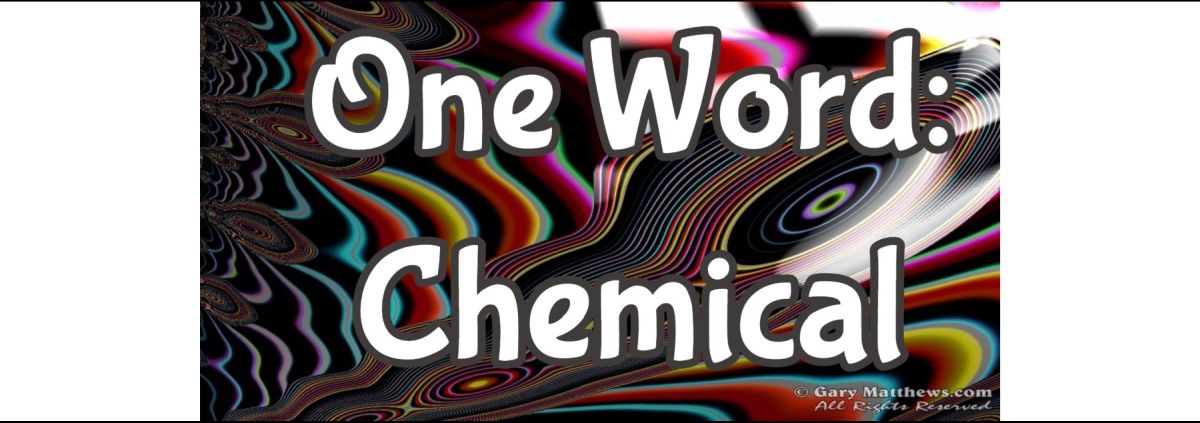How I’d love to have a dime for every time I’ve heard someone express a liking for “chemical-free food” – or something similar.
Let’s break this down:
A chemical is any substance that can be defined by its atomic or molecular composition. That covers a lot of ground!
Any element is a chemical, an element being any substance that can be defined by a single atom. Thus hydrogen (H) and oxygen (O) are chemicals.
Any compound is also a chemical, a compound being any substance defined by two or more bonded atoms. Thus water (H2O), consisting of bonded hydrogen and oxygen, is a chemical.
To put it another way: If something has its own symbol in the periodic table, or if you could identify it by stringing together two or more such symbols, then it is a chemical. The iron in your blood is a chemical. The amino acids in your protein shake are chemicals. The natural vitamin C in your organic orange juice. is a chemical.
Is Any Substance Chemical-Free?
There therefore is no such thing as chemical-free food. All matter – everything you eat, drink, breathe, touch, and see – consists of chemicals. You can’t get away from them.
But of course that isn’t what folks mean when they talk about “chemical-free food” or “farming without chemicals” and the like. In this context, they mean artificial or synthetic chemicals. The implication being that such chemicals are Very Bad Things.
To be fair, they often are! There are thousands of nasty toxins being added to our food, spewed into our air, and leaked into our groundwater. Some are implicated in cancer, dementia, suicidal depression, and any other harm you can imagine. I donate money to causes that oppose such chemicals. I work to keep them away from myself and my family. So yes, I get it.
But it’s more complicated than just demonizing “chemicals”. Or even “artificial” chemicals. It gets blurred when chemists create, in the laboratory, chemicals identical to those found in nature. You can synthesize water, vitamin C, sugar, and almost any other chemical.
Not all “natural” chemicals are good, all the time, in all quantities. Sugar is undeniably natural, and your body must have some in order to function. Too little and you die. But too much, and you develop insulin resistance, obesity, and too many life-degrading problems to itemize.
So is sugar a good chemical or a bad one? It’s “natural” – but what if it is artificially purified and added to your food in unnatural quantities?
Many drugs are “unnatural” in the sense that we don’t find them in nature. (Lots of exceptions. Penicillin, anyone?) And I tend to loathe drugs, avoiding them like the plague. But in certain emergencies a not-to-be-found-in-nature drug is the only thing that can save your life. I’m not prepared, at such moments, to be too squeamish about “chemicals”!
And Yet ……
Okay. Enough with the medical and environmental issues. Let’s step back and think just about the lexical one: Is it always wrong to use “chemical” as shorthand for an artificial, unnatural chemical?
Not necessarily! It pains me to say this – but there, I’ve said it: Not necessarily.
This usage (as in “chemical-free food”) has become so commonplace that the gods of descriptive language now consider it acceptable. It’s being recognized by Oxford, Merriam-Webster, and other standard dictionaries.
In passing through a hospital emergency room, I recently noticed a sign giving panicky instructions on where to go, and what to do, “if you’ve been exposed to any chemical”. The sign conjured up images of masks and antidotes and haz-mat suits.
I thought about all the oxygen and nitrogen and carbon dioxide and other chemicals to which I was being exposed at that very moment. (Oh, and let’s not forget the second-hand smoke from nurses on break, puffing right outside the hospital door.)
The temptation was strong to take a marker pen and edit the sign. That’s an occupational hazard of being a word-monger. But I just sighed and walked on by.
(This article is part of my series on words that are #worth1000pictures.)

